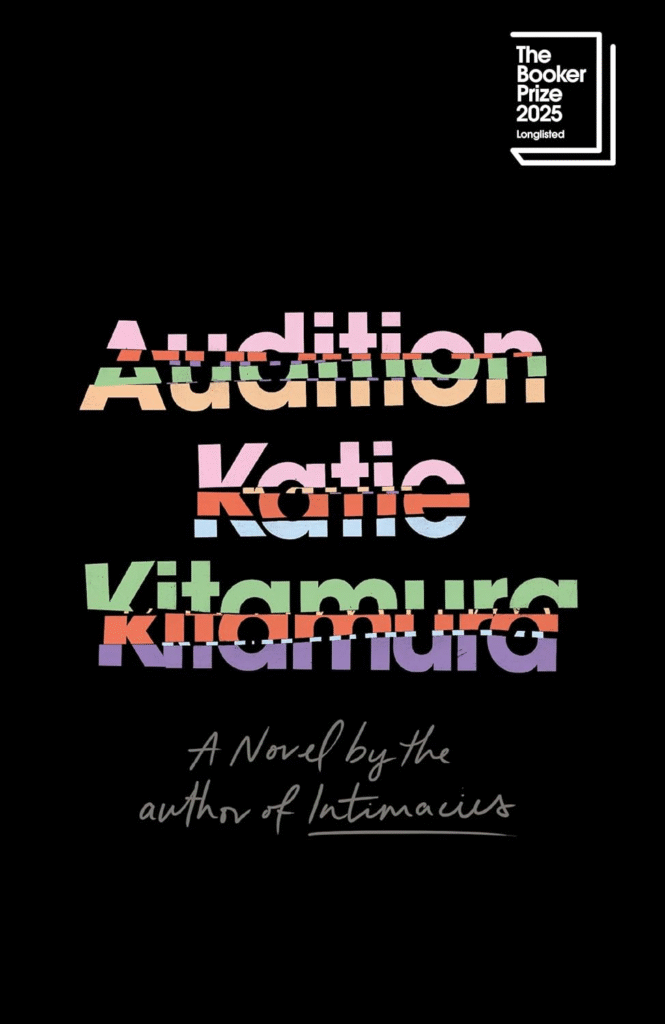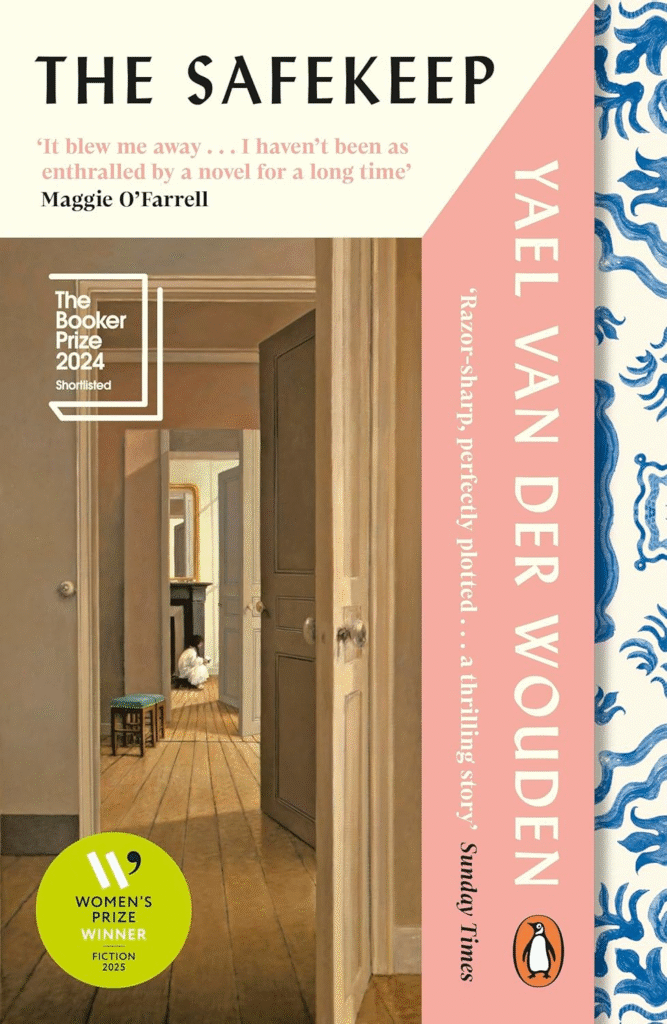Hunchback by Saou Ichikawa, released on 6 March 2025, is a groundbreaking Japanese novella that has already gained international attention for its fearless storytelling and powerful themes. Hunchback is not just an important work of disability literature but also a bold piece of Japanese literary fiction that challenges social norms. At less than 100 pages, this short novel proves that size does not limit impact, delivering a story that is darkly funny, unsettling, and deeply moving.
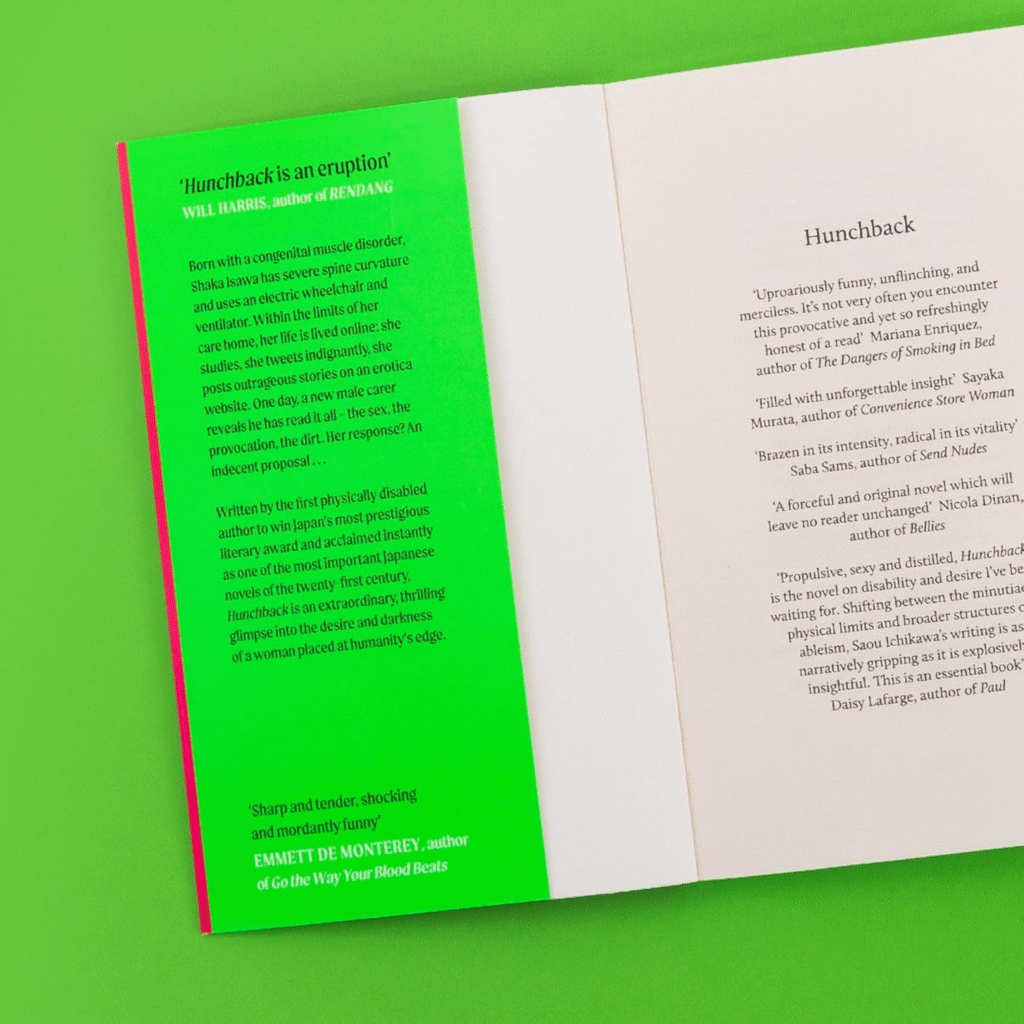
In this slim yet potent work, Ichikawa, the first disabled author to win Japan’s prestigious Akutagawa Prize forces us to confront ableism, bodily autonomy, and the tension between invisibility and exploitation. Translated by Polly Barton and longlisted for the International Booker Prize in 2025, Hunchback is not only a vital piece of disability literature, but great literature, period.
The novel follows Shaka Isawa, a wealthy heiress born with congenital myotubular myopathy, a rare muscle disorder that has left her dependent on an electric wheelchair and ventilator. Despite her physical limitations, Shaka has an unrestrained and rebellious mind. She studies through online courses, writes provocative erotic fiction, and posts daring tweets that confront ableism and society’s discomfort with disability and sexuality. Through Shaka’s voice, Hunchback becomes a striking commentary on bodily autonomy, power, and the right to desire, pushing readers to think about questions that are often ignored.
What makes Hunchback extraordinary is its unsentimental and witty approach. Saou Ichikawa, who herself lives with the same condition as her protagonist, writes with sharp intelligence and irony, exposing how disabled individuals are often written out of mainstream narratives. The translation by Polly Barton ensures that the biting humour and emotional weight of the story reach global readers. By mixing feminist themes, social critique, and moments of dark humour, Hunchback proves why it has become a literary sensation in Japan and now across the world.
Read Also: Human Edge in the AI Age by Nitin Seth | Book Review
Book Details and Availability
Hunchback is a groundbreaking novella by Japanese author Saou Ichikawa, published in English by Penguin on 6 March 2025. The book, translated by Polly Barton, explores the life of Shaka Izawa, a woman with congenital myopathy, as she navigates her desires, autonomy, and societal expectations. Hunchback is available in multiple formats to suit different readers: the paperback edition has 112 pages and is priced at ₹376, the Kindle edition is ₹358, the hardcover edition costs ₹1,539, and the audiobook is available for free. Readers can purchase the book from major online stores like Amazon India, Flipkart, Penguin Random House India, and Book Depository, or find it at local bookstores. This novella is ideal for those interested in contemporary Japanese literature, disability narratives, and bold, socially conscious fiction.
Read Also: In the Times of Love and Longing | Book Review
About Saou Ichikawa
Saou Ichikawa (市川沙央), born in 1979 in Kanagawa Prefecture, Japan, is a groundbreaking Japanese author known for her debut novella Hunchback. She was born with congenital myopathy and has used a ventilator since the age of 13, relying on an electric wheelchair for mobility. She also has an older sister who shares the same condition.
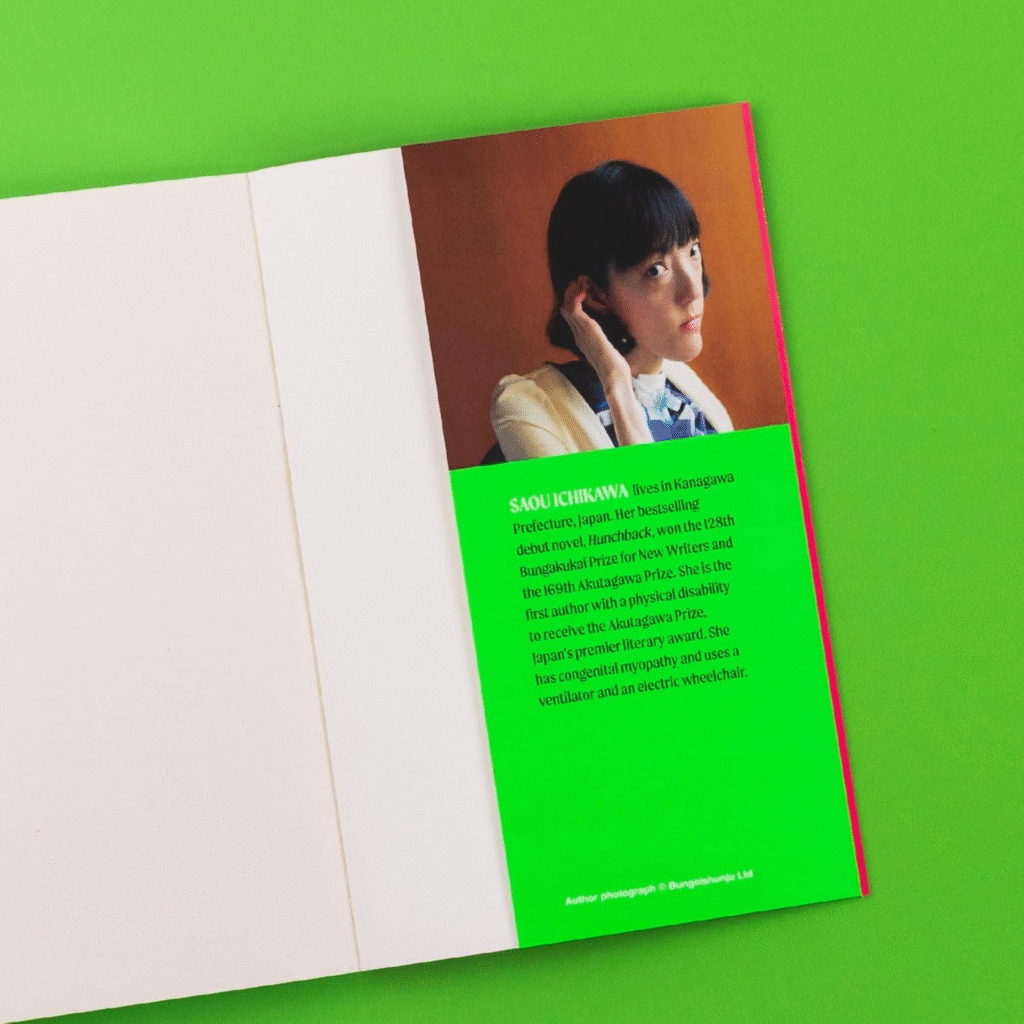
Ichikawa decided to become a novelist at the age of 20, as her disability limited her traditional career options. She initially wrote light novels but shifted to serious fiction after a light novel she submitted failed to win a prize. She graduated from Waseda University, where she studied the representation of disabled people in literature and a focus that deeply influenced her writing.
Growing up, Ichikawa was inspired by Michael Bond’s Paddington Bear series and Enid Blyton’s St. Clare’s books. She also cites classics like Dostoyevsky’s The Idiot and Hermann Hesse’s Siddhartha as significant influences on her literary outlook.
Her debut novel, Hunchback, published in 2023, tells the story of Shaka Izawa, a profoundly disabled woman living in a care home who challenges societal norms around desire, autonomy, and disability. The book sold over 230,000 copies in Japan and was described by Japan Times as “dark and funny.” Ichikawa became the first physically disabled author to win the prestigious Akutagawa Prize for this work. Novelist Keiichiro Hirano, a juror for the prize, praised Hunchback for “knocking down conventional wisdom and common sense centred on able-bodied people.”
Viking Press acquired the English rights, and Polly Barton’s translation was released in 2025. The translation received starred reviews from both Publishers Weekly and Kirkus Reviews, which praised its social commentary, candid depiction of disability, and fearless critique of ableism and sexism. The English edition was also longlisted for the 2025 International Booker Prize, further cementing Ichikawa’s reputation as a writer who confronts societal norms while giving voice to marginalized experiences.
Ichikawa’s writing is marked by its raw honesty, sharp humor, and powerful critique of social expectations. Her work challenges readers to reconsider assumptions about disability, autonomy, and the human experience, making her one of the most important contemporary voices in Japanese literature.
Read Also: Aghori: An Untold Story | Mayur Kalbag | Book Review
Thematic Analysis of Hunchback
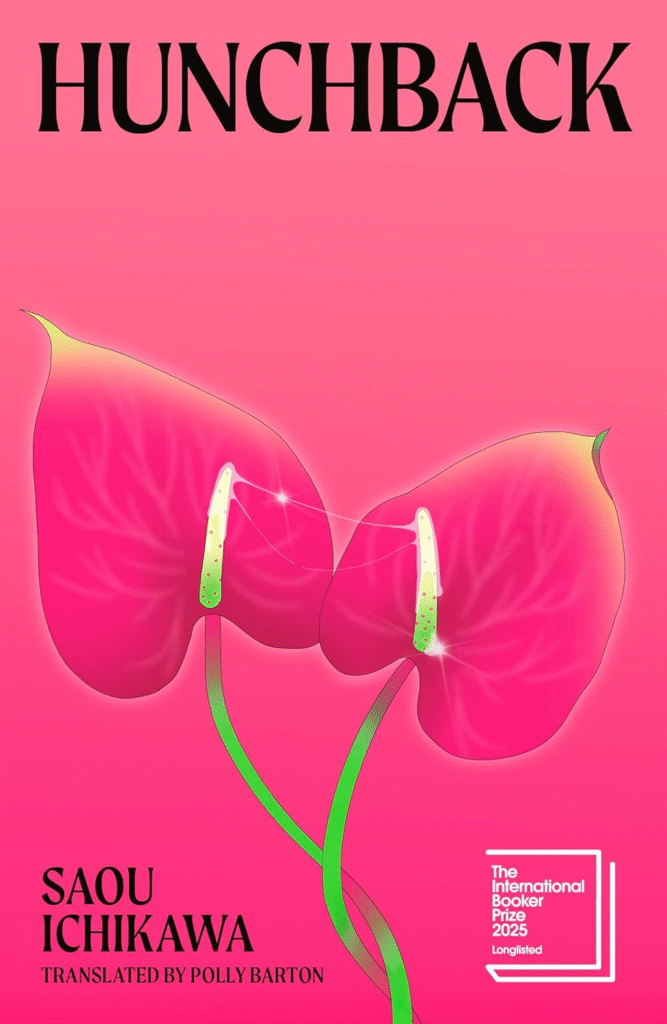
- Disability and Identity: Hunchback explores how disability influences daily life while emphasizing that it does not define a person’s entire existence. Shaka Izawa’s rare congenital myopathy shapes her physical struggles, yet her identity shines through her online studies, fiction writing, and social media presence. The novel demonstrates that ambition, intelligence, and humour thrive even within physical limits or disability of muscles, reminding readers that identity extends far beyond a medical condition.
- Voice, Sexuality, and Reproductive Rights: Shaka’s unapologetic exploration of sexuality and reproductive autonomy is one of the most striking elements of Hunchback. She writes erotic fiction, expresses her desires openly on social media, and confronts societal taboos, challenging the misconception that disabled people are asexual: “Disabled people were not sexual beings – I had assented to the definition that society had created.” Her pursuit of reproductive rights and control over her body underscores the importance of personal agency, making this a bold statement about human dignity and equality.
- Ableism and Cultural Exclusion: The novella critiques societal and cultural ableism, exposing barriers that disabled people face in everyday life. Shaka’s struggle to read physical books exemplifies these challenges: “Here was I, feeling my spine being crushed a little more with every book that I read, while all those e-book-hating able-bodied people… persisted in their state of happy oblivion.” Hunchback highlights how cultural and literary spaces can exclude those with disabilities, prompting readers to reflect on privilege and accessibility.
- Humour, Defiance, and Resistance: In Hunchback, Shaka transforms humour into a form of rebellion. Her witty social media posts and sarcastic commentary challenge societal perceptions of disabled individuals as fragile or pitiable. Humour becomes a tool for empowerment, turning vulnerability into strength while defying stereotypes and encouraging readers to reconsider assumptions about ability and resilience.
- Society, Independence, and Freedom: Shaka’s life in a care home underscores the tension between societal restrictions and personal freedom. She constantly negotiates her independence against the limitations imposed by ableist attitudes. Through her actions and thoughts, Hunchback illustrates the struggle for dignity, autonomy, and self-determination, making it a profound commentary on social expectations and the right to live on one’s own terms.
- Technology as a Lifeline: Technology is central to Shaka’s ability to engage with the world in Hunchback. Online courses, writing platforms, and social media allow her to study, express herself, and build connections beyond her physical limitations. This theme highlights how digital tools can empower people with disabilities, bridging isolation and enabling creative and social expression.
- Loneliness and the Search for Belonging: Shaka experiences deep physical isolation, yet she seeks connection through creative work and virtual interactions. Hunchback explores how loneliness interacts with the human need for community, showing that belonging can be pursued even in constrained circumstances. The novel captures the emotional texture of solitude and the resilience required to form meaningful connections despite barriers.
- Gender, Feminism, and Social Expectations: Shaka’s journey also addresses societal expectations for women. Her open expression of sexuality and refusal to conform to passive or dependent roles challenge cultural norms about femininity and disability. Hunchback presents a feminist perspective, emphasizing the right of women who is disabled or not to define themselves outside of imposed limitations.
- Resilience and Strength: Despite her physical vulnerabilities, Shaka demonstrates remarkable resilience throughout Hunchback. Every act of studying online, writing provocative fiction, tweeting daring opinions which reflects a strength of spirit. The novella portrays resilience not as passive endurance but as active resistance, encouraging readers to reconsider conventional ideas about courage and fortitude.
- The Power of Storytelling: Hunchback emphasizes the importance of narrating one’s own life. Shaka writes fiction, tweets, and documents her experiences as a way to assert her story: “Those words were born from the slimy, gunky sludge of the swamp, the mud out of which the lotus flowers grew. Without mud, the lotus could not survive.” Storytelling becomes a tool of resistance, identity, and self-definition, showing the transformative power of sharing one’s voice.
- Body Awareness and Mortality: The novella presents an unflinching depiction of the disabled body, showing the fragility of life and the constant challenges Shaka faces: breathing difficulties, infection risks, and daily physical exertion. Hunchback blends these physical realities with existential reflection, emphasizing courage, self-awareness, and the human confrontation with mortality.
- Desire, Taboo, and Transgression: Shaka pursues unconventional desires and challenges societal taboos, making sexuality, bodily experience, and transgression central to Hunchback. Her fantasies and actions provoke discomfort, forcing readers to confront biases about marginalized bodies and the policing of desire. By exploring these boundaries, the novella highlights autonomy, liberation, and the complex relationship between social norms and personal experience.
Notable Quotes from Hunchback
Read Also: The Shortest History of Israel and Palestine | Book Review
“To live, my body breaks.”
This quote reflects the physical reality of disability and daily struggle for Shaka Izawa. Hunchback portrays how living with severe congenital myopathy is a constant negotiation with pain, exhaustion, and medical dependency. It emphasizes that life with a disability requires resilience and determination.
“My ultimate dream is to get pregnant and have an abortion, just like a normal woman.”
Here, Shaka asserts her sexual and reproductive agency. Hunchback challenges societal taboos by showing that disabled women also have desires, fantasies, and rights over their bodies. The quote underscores autonomy and reproductive freedom for disabled individuals.
“He’s self-identifying as a beta male. He’s probably an incel! Fuck!”
This humorous, defiant quote illustrates Shaka’s voice and courage to challenge social norms. Hunchback uses sarcasm and wit to critique ableism and misogyny in society, showing how humor becomes a tool for empowerment.
“Disabled people were not sexual beings – I had assented to the definition that society had created.”
This statement highlights societal misconceptions and ableism about disability and sexuality. Hunchback critiques cultural norms that erase the sexual identity of disabled individuals, emphasizing Shaka’s fight against invisibility.
“Being able to see; being able to hold a book; being able to turn its pages… I loathed the exclusionary machismo of book culture.”
This quote reveals accessibility issues in literature and culture. Hunchback exposes how physical limitations can prevent participation in cultural life, highlighting systemic ableism. Shaka’s resentment towards able-bodied privilege underscores the need for inclusive spaces.
“Here was I, feeling my spine being crushed a little more with every book that I read, while all those e-book-hating able-bodied people… persisted in their state of happy oblivion.”
This builds on the previous quote, showing the intersection of physical struggle and societal privilege. Hunchback critiques the inaccessibility of everyday cultural practices, highlighting the tension between disabled and able-bodied perspectives.
“Those words were born from the slimy, gunky sludge of the swamp, the mud out of which the lotus flowers grew. Without mud, the lotus could not survive.”
This quote symbolizes resilience and creative expression. Shaka’s writing becomes a metaphor for growth despite adversity. Hunchback emphasizes that expression, storytelling, and humour emerge from struggle, turning hardship into empowerment.
“When you’ve got no money problems and plenty of health problems, you end up living a very chaste sort of existence.”
Shaka reflects on the intersection of wealth and disability. In Hunchback, financial privilege allows her some autonomy, but it cannot fully remove the daily limitations imposed by her condition. This quote highlights complex societal dynamics for disabled people.
“If when moving about inside this one-room flat of mine, I always planned each and every movement meticulously before getting up.”
This line demonstrates the meticulous planning and survival strategies necessary in daily life for someone with severe disability. Hunchback realistically portrays how living with myopathy requires attention, precision, and resilience.
“Holding in both hands an open book three or four centimetres in thickness took a greater toll on my back than any other activity.”
This shows the physical impact of everyday activities. Hunchback emphasizes the unseen challenges of disability, highlighting how mundane acts can be painful and demanding, raising awareness about lived experiences.
Read Also: Forest of Noise | Mosab Abu Toha | Poetry of Gaza
Why You Should Read and Buy: Hunchback
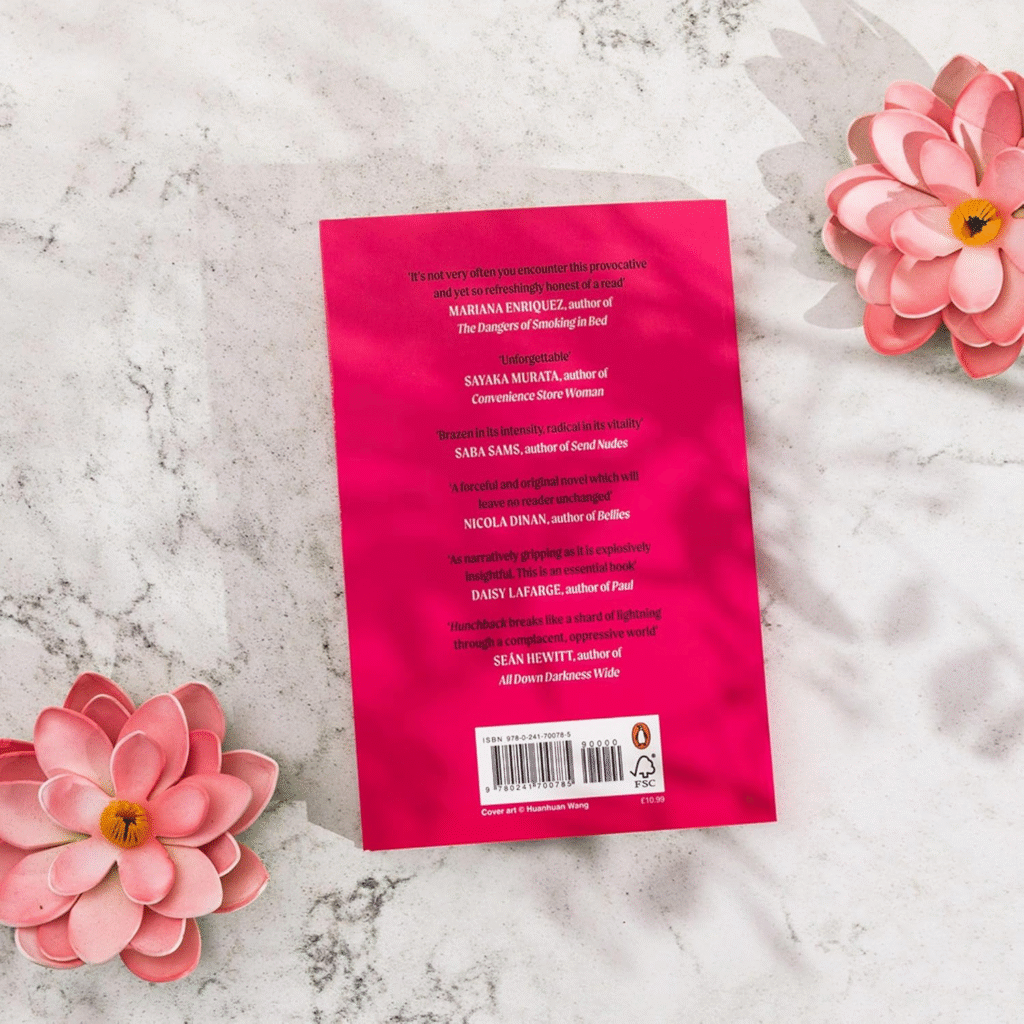
Hunchback by Saou Ichikawa is a daring and unforgettable novella that immerses readers in the life of Shaka Izawa, a woman with severe congenital myopathy. Written in a sharp, wry, and unapologetically honest style, the book captures the physical realities, desires, and frustrations of living with a disability. Shaka’s voice is both humorous and defiant, reflecting the author’s fearless language and keen social insight. As Shaka notes, “To live, my body breaks,” a statement that underscores the daily challenges she faces while asserting her agency and individuality. It gives readers an intimate look into the life of Shaka Izawa, a woman living with a severe muscle disorder, and her struggle to claim autonomy, express sexuality, and assert her individuality.
This novella is not only a story about disability but it is a critique of societal ableism, gender norms, and cultural exclusion. Ichikawa’s prose is concise yet piercing, blending dark humour, bold sexuality, and psychological depth in a way that mirrors the protagonist’s unflinching perspective. The language is vivid, matter-of-fact, and often provocative, forcing readers to confront uncomfortable truths about the way society treats marginalized bodies.
Reading Hunchback is an essential experience for anyone interested in contemporary literature that challenges social conventions. It celebrates resilience, autonomy, and the courage to live fully despite physical limitations. Saou Ichikawa’s writing offers a rare and authentic voice, making this novella a powerful reflection on identity, freedom, and the human spirit. The book is unapologetically honest, blending dark humour, raw physical realities, and sharp social critique, making it a rare literary work that confronts societal biases head-on.
For anyone interested in contemporary literature that pushes boundaries, explores marginalized voices, and forces reflection on societal structures, Hunchback is essential. It is a story about resilience, freedom, and the courage to live fully in a world that often overlooks the disabled.
Final Thoughts
Hunchback by Saou Ichikawa is a striking and unconventional novella that offers a rare glimpse into the life of a woman living with severe disability. Through Shaka Izawa’s candid thoughts, sharp humour, and unfiltered voice, the book challenges societal assumptions about ability, desire, and personal freedom. Its daring exploration of autonomy, sexuality, and identity, combined with Ichikawa’s distinctive, bold, and witty writing style, makes it a powerful and unforgettable read. Hunchback is a compelling story that inspires reflection, empathy, and a deeper understanding of marginalized experiences.
Read Also: James | Percival Everett | Book Review



